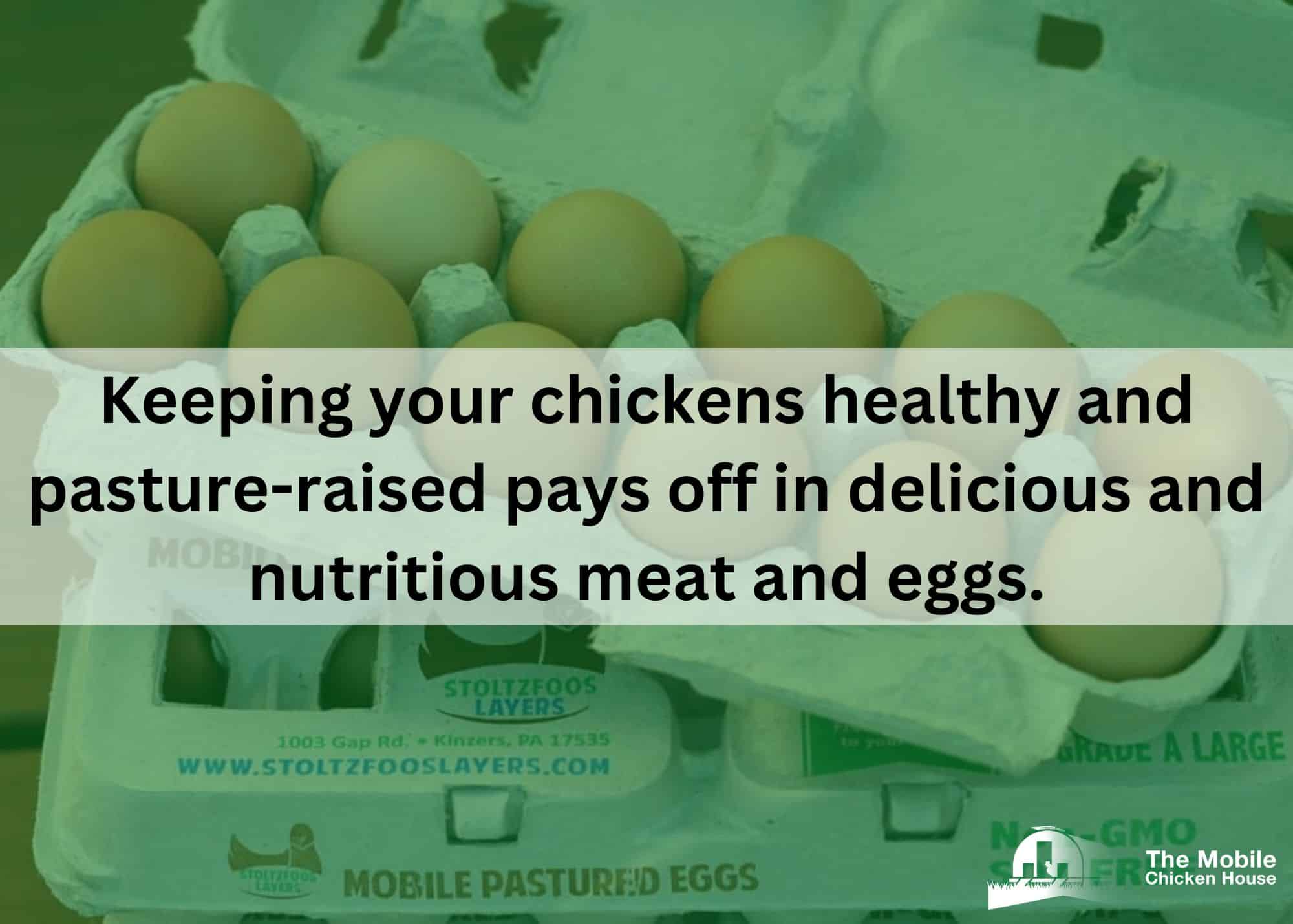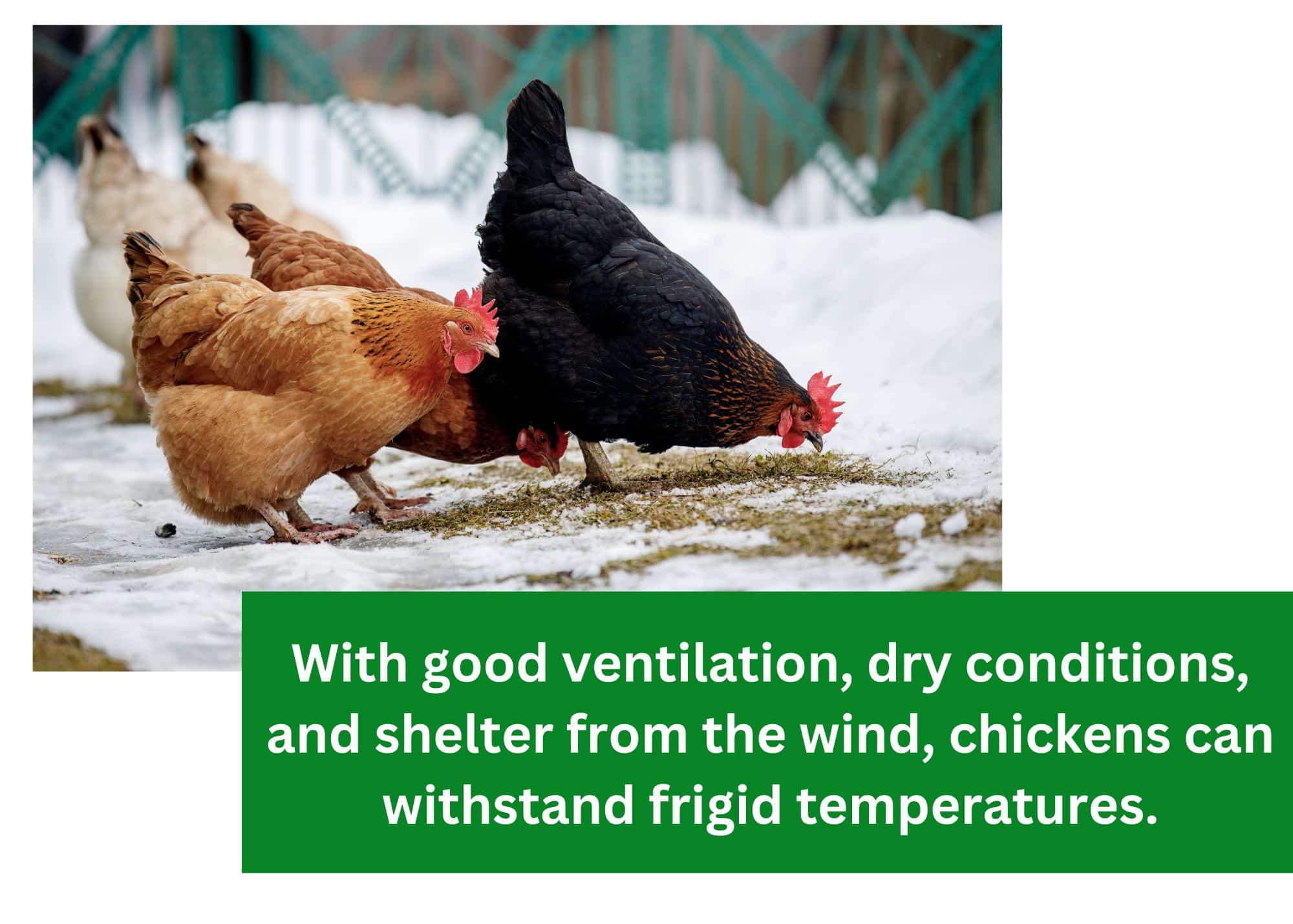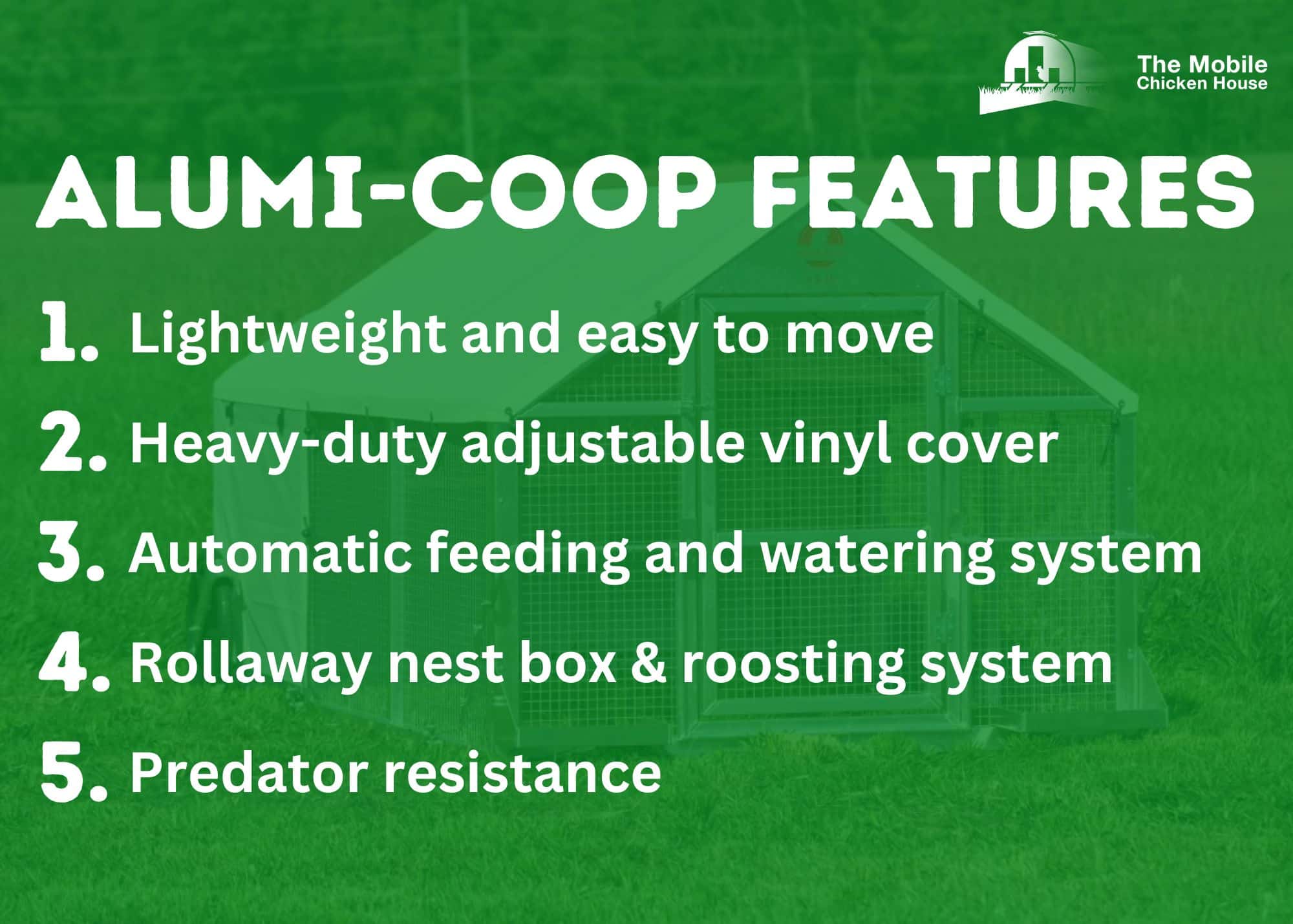Small Mobile Chicken Coops: An Introduction
Backyard chickens are a great way to provide your family with nutritious, sustainable food or to supply eggs to your community as a small business.
But if you get the wrong coop, your chicken farming dream may turn into a nightmare as you lose chickens to predators or disease and struggle to keep up with chicken poop scooping.
Many farmers choose to eliminate poop-scooping altogether by purchasing a mobile chicken coop. But this can cause headaches, too, if your coop is cumbersome to move around.
At The Mobile Chicken House, we’ve been working with chickens for almost 15 years, and we understand the ins and outs of getting the right mobile chicken house and making it work for you.
That’s why we wrote this article—to help you understand the advantages of small mobile coops and what features you should look for, as well as discuss practical concerns like winterizing your coop and protecting your chickens from predators.
Six Advantages of a Mobile Chicken Coop
A portable chicken coop is a chicken shelter that’s lightweight and mobile, allowing you to keep moving your chickens to fresh pasture. It provides a roof and walls but has no floor. Since it sits directly on the ground, chickens can happily scratch at the dirt and eat bugs from the grass.
A mobile chicken coop is also known as a “chicken tractor” because if you leave it in one place long enough, the chickens will work up the top layer of soil.
Here are the advantages of using a mobile chicken tractor:
- It keeps your poultry healthy. Moving the chicken coop provides your chickens with a fresh array of grass and tasty bugs.
- It provides pest control and fertilizer. Chicken manure is rich in nitrogen and phosphorous, and chickens eat pests like bugs and snails, so as long as you move the tractor frequently, your chickens will help keep your lawn or pasture healthy.
- It allows you to work up your lawn or keep it fresh. If you have a weedy patch, you want to re-seed or an area you wish to turn into a garden, you can park your mobile chicken house and let the chickens work up the ground. Alternatively, moving your chicken coop frequently keeps the chickens from tearing up areas you’d rather keep fresh and green.
- It takes less maintenance. Since there’s no floor in the cage, you barely need to clean it compared to a traditional coop!
- It keeps feed costs down. Since your chickens can supplement their diet with a fresh array of bugs every time you move the coop, you spend less on feed overall.
They produce healthier meat and eggs! Keeping your chickens healthy and pasture-raised pays off in delicious and nutritious meat and eggs.

Nine Features to Look For in a Small Chicken Tractor
As you start looking for the small mobile chicken house that works for you, here are some features you should be looking for.
Basic shelter:
Your chicken tractor should have a roof to protect your poultry from rain and sun and some solid walls or areas where chickens can go for shelter from piercing wind.
Containment:
Most of the walls of your chicken tractor should be made of fencing that will keep your chickens contained while allowing plenty of fresh air and juicy bugs into the coop.
Protection from predators:
Ensure the fencing is robust enough to keep predators out! Beware that just because the fencing keeps the chickens in doesn’t mean it will keep the predators out. You may need to use fencing with smaller holes. Also, make sure your coop is designed to be difficult for predators to tip over.
Durable:
Ideally, your mobile chicken coop should hold up over time, even while being moved every few days, and not need a lot of maintenance.
Easy to move:
This is a big one! If you’re going to move a chicken tractor every few days, you don’t want to dread the task. Choose a lightweight coop with an easy-to-use mobility system.
Enough space for your chickens:
You don’t want your chickens to be overcrowded! A chicken tractor isn’t just a place for your chickens to roost at night; it’s also where they’ll be scratching around for food during the day, so make sure they have plenty of space. Typically, you should aim for at least 2-2.5 sq ft of space per laying hen.
Places to roost and lay eggs:
As with all coops, make sure your chicken tractor has adequate places for your chickens to roost and nesting boxes where they can lay eggs. Bonus points if you get a rollaway nest box, which keeps the eggs clean and easy to gather!
A feeding system:
Look for a low-maintenance feeding system that will provide your chickens with food and water for several days at a time. Since you’re already putting in the effort to move the chicken house around, it’s nice if the feeding system is pretty automatic.
A door for humans:
Make sure your chicken tractor is accessible to humans as well as chickens! It should have a human-sized door, so if you have a sick bird or need to do maintenance on the coop, you can walk inside and handle the problem.
Now that you understand the basic features you should look for in a mobile chicken house, let’s take a closer look at a few issues you may run into and how to handle them.
Winterizing a Small Mobile Chicken Coop
Chickens are pretty hardy creatures. If they have good ventilation and stay dry, they can withstand frigid temperatures, but they need a sheltered place to get out of the wind.

Your coop should already have a roof, but when winter comes, you’ll want to cover the fencing with a wind block. Depending on your coop, you can use plywood, plastic sheeting, or tarps to cover the walls.
However, it’s vital that your chickens stay dry and well-ventilated, so don’t cover the walls completely—leave some room for air movement!
You can also pull the whole chicken tractor into an outbuilding for the winter or during a particularly cold spell.
Here at The Mobile Chicken House, we offer a wintering kit for our Alumi-coop. It comes with 30 gauge clear vinyl sheets that are attached to the coop with zip ties. To winterize your coop, follow these steps:
- Prepare a six-inch-deep wood chip bed on the south side of a building, two feet wider and longer than your Alumi-coop
- Install our winter enclosure kit using included zip ties
- Pull the Alumi-coop on top of the wood chip bedding, making sure it faces south
- Add shavings as needed to keep bedding dry
Chickens don’t typically need an electric heat source; their natural feather blankets keep them toasty all winter long, and they can withstand temperatures down into the teens.
However, a sudden temperature drop is dangerous, as it can cause cold stress in your poultry. You may want to keep a heating pad on hand in case you have a cold snap where the temperature drops suddenly, especially in the fall if you’ve had relatively nice weather up until that point.
Finally, it’s a good idea to get a heated waterer for the winter!
How to Make Your Mobile Chicken Tractor Predator Proof
When raising chickens, there’s nothing more frustrating than seeing them get picked off one by one by predators!
The type of predator protection you’ll need depends somewhat on what predators you’re dealing with. Chickens in a mobile chicken house won’t be susceptible to birds of prey because they’ll be protected by the roof.
However, other predators can slip through the fencing even if the holes are small enough to keep the chickens in. Generally, the smaller the gaps are, the better. The safest route is to reinforce the siding with ¼ inch hardware cloth, especially if you suspect that predators are reaching through the bars to kill your chickens.
If your chicken tractor is lightweight and you have problems with the wind blowing it over or predators tipping it over, you may need to stake it down with large nails.
Finally, you can raise another animal to protect your chickens, such as a well-trained protection dog, a rooster, or even a goose! After all—if predators take all your chickens, you won’t be able to run a profitable poultry business.
Introducing the Alumi-Coop
Here at The Mobile Chicken House, we believe you deserve a profitable and efficient mobile chicken operation! That’s why we sell chicken tractors designed specifically to address all the needs you’ll have as a small-scale backyard chicken farmer.
Our Alumi-Coop comes in four different sizes to accommodate both small and larger backyard chicken operations, so you can find a coop that suits your needs.

Our coops have some great features:
- Lightweight and easy to move: If you’ve ever used a chicken tractor, you’ll appreciate this feature! With a lightweight aluminum frame and large adjustable wheels, the task of moving your chicken house around goes from being a dreaded chore to a breeze.
- Heavy-duty adjustable vinyl cover: Winterizing your coop is easy with our vinyl cover. You can cover one wall to block the wind, cover all four walls to winterize the space, or leave everything open for summer months.
- Automatic feeding and watering system: With the effort of moving your coop every few days, the last thing you want is a labor-intensive feeding process on top of that! Our automatic system means you can fill up the feed and water tanks and then not have to worry about it for several days.
- Rollaway nestbox & roosting system: Our roosting system gives birds a place to sleep, and the nestbox is designed on a slight slope so eggs roll to a collection area for easy egg gathering!
- Predator resistance: The 1″x1″ 14-gauge galvanized after-weld netting on our coops keeps even the most determined predators from slipping through.
If you’re interested in purchasing an Alumi-Coop for your own backyard chicken operation, visit our website to get a quote, or contact us with any questions you may have.
Or maybe we’ve already answered your question for you, in our blog post answering the 11 most-asked questions about mobile chicken coops.
Either way—we can’t wait to help you!





